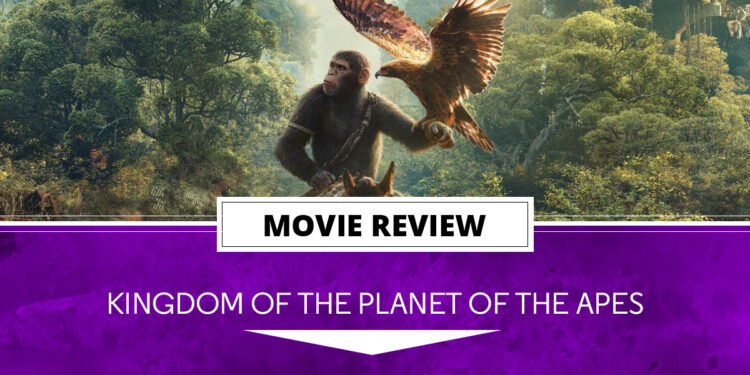Fans of sci-fi storytelling have been enjoying a resurgence of classic franchises, including the revival of the Planet of the Apes series. The trilogy of films that told the story of Caesar and the rise of the apes was emotional, thrilling, and a marvelous display of visual effects that made audiences believe in walking and talking apes. But does this same magic continue in Kingdom of the Planet of the Apes, the fourth film of the rebooted series? In some ways, it does, but in others, it fails to live up to the hype or the legacy of its predecessors.

Taking place around 300 years after the time of Caesar, Kingdom of the Planet of the Apes is a standalone sequel that springboards off the fallout of the previous films. The story focuses on Noa (played by Owen Teague), an ape from the Eagle clan whose village is destroyed by another clan of apes in pursuit of a human named Mae (played by Freya Allen). The group is under the command of an ape named Proximus Caesar (played by Kevin Durand), who takes control of an abandoned military facility and has enslaved other apes under his kingdom. While Noa journeys to find and free his surviving clansman, he comes into contact with Mae and discovers many aspects of the ape world he never knew before. The revelation that so much has been twisted about Caesar and what he knew about human relations with apes will shake the world he thought he once knew everything about.
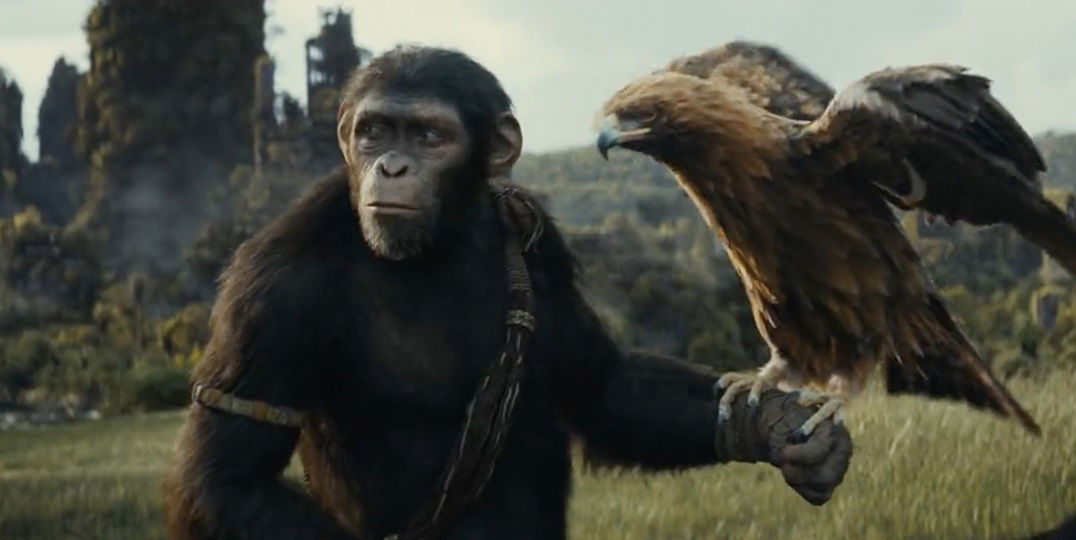
The one part of Kingdom of the Planet of the Apes that stands out the most is the visual effects. The movie does a fantastic job of showing audiences beautiful landscapes of abandoned cities repopulated with nature. Over the course of 300 years, wildlife and green have overtaken the once densely populated human cities. At the same time, every CGI ape on-screen moves and reacts with a unique blend of animal and almost human-like qualities to the world around them. They look and sound great, along with nearly every other creature we see them come into contact with.
But while the visuals of the film are on the same level as the rest of the series, the story is not as good. Noa’s tale feels smaller in comparison to the events that happened with Caesar in the three films beforehand. By the time the movie ends, it doesn’t feel like Noa or his actions have affected much of the world around him. Noa himself is a protagonist that audiences can get really behind as we see him struggle and overcome many hurdles on his journey. But unlike Caesar, his place in this world feels downplayed or insignificant and almost doesn’t have a ripple effect outside his clan’s village and Proximus’ small kingdom.
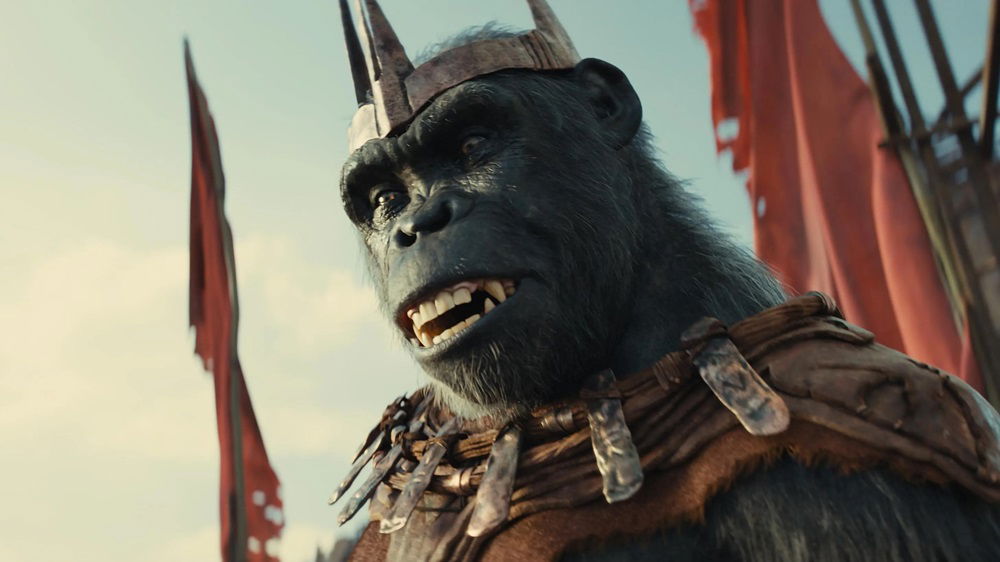
Speaking of which, Proximus appears to be more important in the movie’s trailers than he is in the actual film. We don’t get to see him until much deeper into the film’s runtime, where he rules over the small area of apes that have been absorbed into his tribe. He takes on the name Caesar and twists much of his story to fulfill his selfish needs, which seems interesting at first but never the film goes deeper with it. The apes under him have access to some human weapons (specifically electroshock sticks), but they don’t have any of the weaponry or tools that the apes of Caesar’s time do. He is obsessed with opening up a vault in the facility he believes will give him instant power and advancement in evolution, which, in truth, is gaining access to weapons that were stored. As a villain, he had a lot of potential to become a big threat looming over the entire story but ultimately doesn’t live up to anything that could have been.
The human characters in Kingdom of the Planet of the Apes feel like the most inconsistent part of the story. There is a twist halfway through the film that changes the way we see Mae for the remainder of Noa’s story, which leads to major events by the end. However, details about it feel as if they come out of nowhere and result in something with major implications for the future of the series. One of the central themes of the Planet of the Apes movies is the shaky trust between humans and apes, which is present here in many ways but feels more heavy-handed in the latter half of the film.
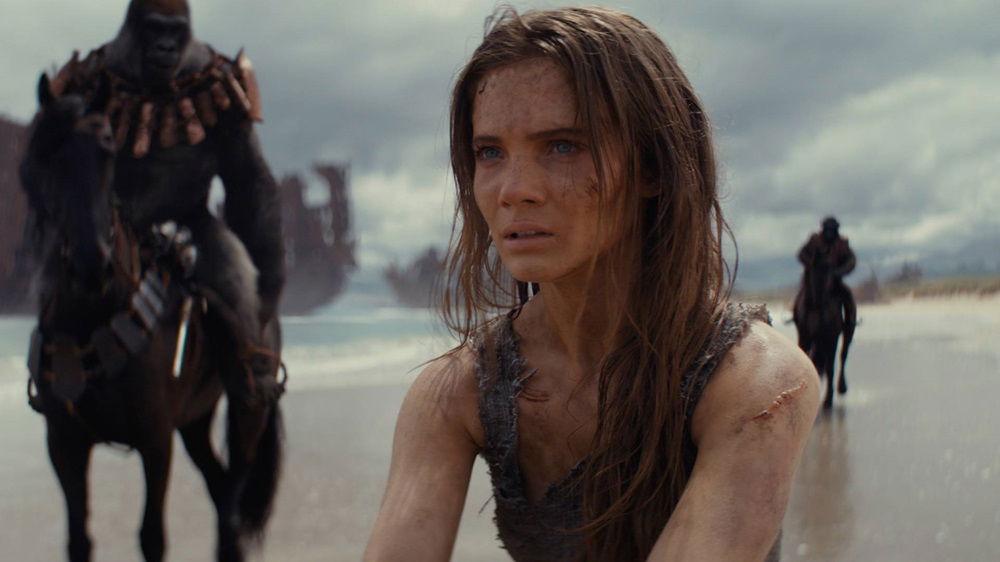
At the same time, the movie includes other human characters for a very brief period that doesn’t seem to do much. One of them is Trevathan, played by William H. Macy, who is a prisoner to Proximus and teaches him aspects of history and human society. His story comes to an abrupt end just before the climax of the film, despite details of his allegiance and outlook on the world being very interesting. How his views clash with Mae’s and what it could mean for Noa would have been something to spend more time with and bring into the finale of the story. But as is, everything is cut off suddenly.
Another character that is gone way too soon is Raka (played by Peter Macon), an orangutan with great knowledge of Caesar that Noa comes across on his travels. In scenes with him and Raka talking, we get a sense of just how much about Caesar’s story has been changed over time, as well as how much the apes have made him into a Jesus-like figure of their race. There are a lot of religious parallels that further emphasize the similarities between ape and human, but really challenge and impact Noa from that point onward. It’s some of the most interesting dialogue of the film that makes his exit later disappointing. Had the character been around longer, there could have been a great battle of philosophies in relation to Caesar with Proximus and Raka, something the film never fully explores as much as it should.
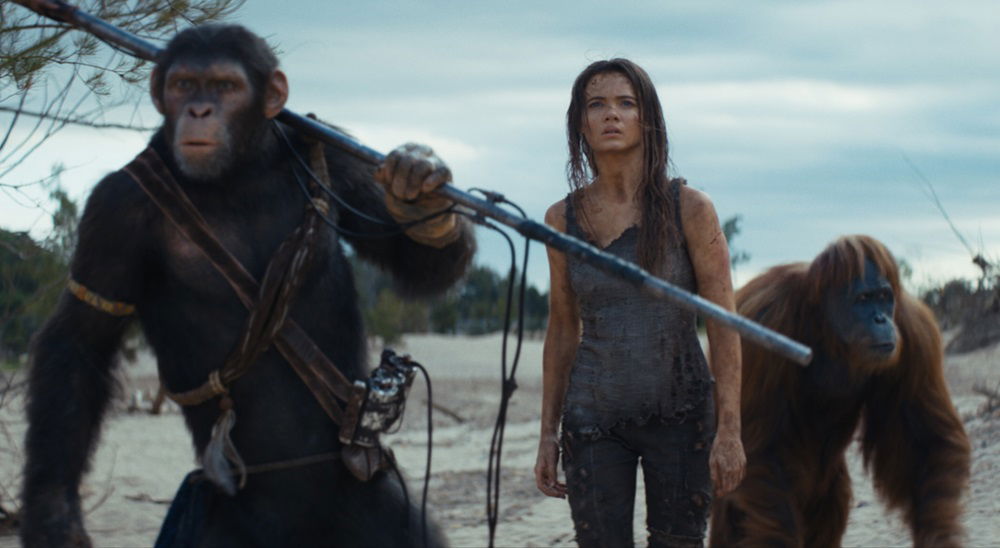
Despite many of these shortcomings in the plot, the acting of everyone in the cast is very well done. Every ape character emotes with great reactions and is sold to the audience by their interactions with Mae on screen. It’s a very difficult task to get audiences to care about a CG character, but luckily the Planet of the Apes series has a great record of doing so. Despite being mostly apes, we can feel something real about the struggles they have and the actions they take with an almost human-like quality. All of it plays very nicely into the themes of the series, which plays with how we personally relate to our distant animal cousins and what craziness happens to them in the movie.
The unfortunate truth is that Kingdom of the Planet of the Apes is not better or as good as the previous Apes films. But it’s not a terrible sequel to them, either. There’s definitely something here to move the series forward into new territory, but this story could have had a bigger impact with a few changes. If Noa is the new hero in future films, then it would’ve been nice to see him become a more important figure in the ape world as we see it now. If you’re someone who has been watching all the new Planet of the Apes movies up to this point, you’ll still find enough enjoyment in seeing what might be next for this world.
Summary
Kingdom of the Planet of the Apes has great visual effects on par with previous entries of the series. While there are interesting ideas explored, they are never fully realized by the end. Some aspects of the story cause everything to stumble along the way to its conclusion, holding it back from being as great as its predecessors. There is promising things for what may come after, but it’s a rough journey getting to that point.
-
Kingdom of the Planet of the Apes


